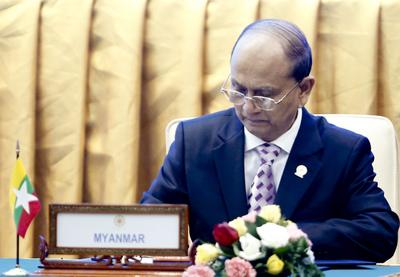At present, gross government debt as a percentage of GDP is estimated at 45.7 per cent. This is hardly extraordinary by global standards, and only fractionally higher than neighbouring Thailand. However, Myanmar’s tax-to-GDP ratio of 3.2 per cent (excluding resource revenues, which are not publicly disclosed) is by far the lowest in ASEAN.
The biggest worry for Myanmar is over-dependence on natural resource revenues. Generously endowed with natural gas, jade, precious gems, oil and teak, government budgets have become increasingly reliant upon the export earnings of state owned enterprises (SOEs). Although their contribution is large (gas sales alone account for an estimated 15 per cent of GDP), natural resource revenues are finite and subject to price volatility. A deterioration in global gas prices, for example, would necessitate cuts to government services.
So how can public finances be more responsibly managed? It’s a question with multiple answers: many simple, few easy and none popular. But President Thein Sein and his ministers can’t afford to wait. Just the slightest hint of a fiscal crisis and the trickle of foreign investors will quickly dry up. So in the 18 months left in his term, he should hone in on achievable, reasonable changes to ensure fiscal stability.
The first reform that could be undertaken before the 2015 election is a review of the 2012 Foreign Investment Law. Introduced with quiet approval from the international community, the law provided a much needed legal framework for foreign firms investing in Myanmar. To further encourage businesses, however, an overly generous provision was included allowing foreign investment to be tax free for the first five years. Unsurprisingly, local firms cried foul, and the playing field was altered once again with the passing of the Myanmar Citizens Investment Law in July 2013.
The current arrangement is certainly fairer, but maddeningly short-sighted, diluting an already narrow tax base. As it currently stands, both local and foreign firms have a ‘tax holiday’ for the first five years with the possibility of extension thereafter. Considering Myanmar’s already flimsy public revenue base, it would clearly be preferable to lightly tax company profits, keep the power on and safeguard the country from crippling debt.
The other achievable reform is the introduction of greater transparency within ministries. In Myanmar, unlike most countries, government revenue is not centrally collected and accounted for by the Ministry of Finance. Rather, profits from state-owned enterprises (SOE) involved in the mining of gems, gas and oil, running utilities and undertaking industrial farming are first collected by the Ministry of Mines, the Ministry of Oil and Gas, and so on. Incredibly, these ministers are then authorised to allocate the spending of these revenues, passing on the remainder to the Internal Revenue Department. The lack of oversight, bureaucratic overlap, and potential for influence by vested interests is disturbing.
There is already strong evidence of large-scale corruption implicating senior ministers in the misappropriation of state revenue. For the sake of justice and efficiency, cabinet protocol has to change. Central control of public finances must be asserted, the thousands of remaining ‘other’ ministerial accounts need to be put on public record and SOEs should become liable to the same rules and taxes that apply to privately run firms. Simply publishing each minister’s budget, the contracts they undertake with outside firms and the profits made by individual SOEs would go a long way into moulding more accountable governance and more reliable revenues. The tentative moves towards joining the Extractive Industries Transparency Initiative (EITI) are a positive step in the right direction.
Myanmar’s dysfunctional taxation system will take many years to fix, but these small reforms can help secure its medium-term fiscal position and should be pursued as quickly as possible. Greater transparency and fairer company taxes will help secure funding for essential government services and improve Myanmar’s reputation amongst international investors, accomplishments that only a crony could oppose.
Josh Wood was a Visiting Research Fellow at the Myanmar Development Resource Institute’s Centre for Economic and Social Development (MDRI-CESD) and is a postgraduate student at the ANU.


What important points of the 2012 Foreign Investment Law disturb Foreign Investment in Burma? How does it affect the economy, can you please be more specific?
very much appreciation
Thanks